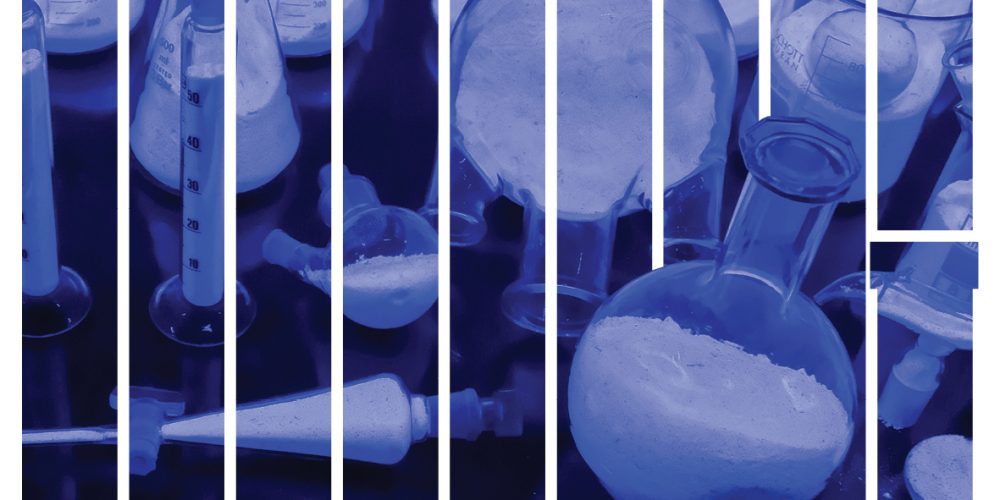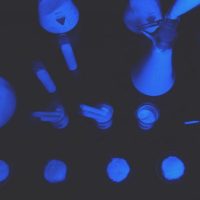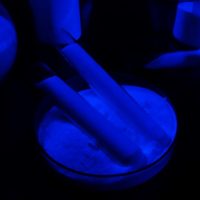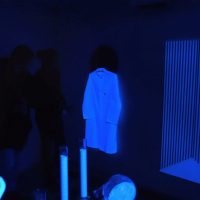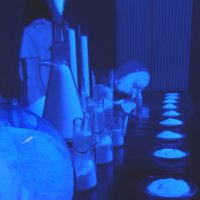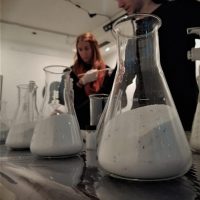OPENING NIGHT: Friday, 9 April 2021, 8 p.m.
Club Kocka Gallery, Youth Center Split, Ulica Slobode 28
The exhibit is open until Friday, April 16th.
Viewings can be arranged by contacting the following number: +385989602701.
ABOUT THE WORK:
With his latest work, an ambiental installation titled Afterwardsness, the young Split-born artist Josip Šurlin makes his first appearance as part of the NMG@PRAKTIKA exhibition cycle. For this occasion he has produced a piece which in many ways alludes to ongoing pandemic-related issues. The name of the exhibit originates in Freudian psychoanalytic theory, appearing originally as the German compound Nachträglichkeit , here referring to a form of suspension of traumatic experiences and delayed retroactive reckoning with such experiences. More specifically, the theory posits that if a memory becomes a trauma and is left suppressed by the individual, its meaning will eventually be uncovered, via introspection, at a later stage in the individual’s psychological development. Though the preceding theoretical sketch attempts to interpret trauma as it pertains to one individual, in the project before us the artist takes the concept of “suspended trauma” and applies it to broader social realities as well. The current trauma caused by the ongoing Covid-19 epidemic began as soon as initial news reports of the outbreak came in and the first stage of lockdown was announced. The delayed reckoning with said trauma is taking place right now, a year after the outbreak, as society begins to retroactively analyze certain events both on an individual and collective level. This is effectively a reliving of previously shelved visions of the Unknown, of uncertainty and mortality, a retroactive immersion in that trauma, even as its resolution remains out of sight to this day.
The installation that makes up this exhibit depicts a fictional space which clearly alludes to the interior of a medical facility such as a hospital or laboratory. Under ultraviolet rays, this imaginative ambience appears as though dislodged from time in its ephemerality, indirectly calling attention to the unstable and unhealthy relationship between society and its spaces of healing, and consequently shedding light on the more general issue of trusting the healthcare system – an issue which has in recent times become markedly prominent, especially with the proliferation of various, often contradictory, reports of a “miracle vaccine”. Healthcare facilities and social service centers reflect, more broadly, the state of a given society’s level of organization with respect to social care, while also revealing general attitudes towards illness. When such spaces are left untended and in disrepair, as indeed they commonly are in Croatia, it is a clear indication that the aforementioned kind of “collective traumatic experience” is under way. Furthermore, when it comes to healthcare and health insurance, descriptors such as “social”, “universal”, “available for all” remain, in our case, as distant as our dreams of pristine, hygienic, white-walled doctor’s offices. The structure of the installation thus embodies a subtle allegory of actual social or sociological issues – ones that may be subsumed under the larger notion of a “cultural neurosis” in our modern way of life, marked as it is by an inevitable and direct dependence both on the psychophysical well-being of the individual and of the community at large. The question then becomes whether or not the collective trusts its own system, and whether the individual person in such circumstances really has a say in the matter?
Reflecting on his own work, Josip Šurlin surmises: “It was not merely with a view to criticizing existing institutions that Afterwardsness, as a vector of social commentary, was conceived. There was also, namely, an impetus to stimulate discourse around the social prerequisites for the preservation of health. Foremost among them are the previously mentioned spaces of healing, bearing in mind the following question: To what extent is the general relationship of society and day-to-day matters of healthcare an essentially unstable one, susceptible to fear(mongering) and dependent on state-held power that consistently jeopardizes its immune defense?”
ABOUT THE ARTIST:
Josip Šurlin (born in Split, 1993) graduated from the School of Fine Arts in Split in 2012. That same year he proceeded to join the Arts Academy of the University of Split, with a focus on painting. He studied under professor Gorki Žuvela and in 2017 obtained his degree under the mentorship of professors Viktor Popović and Neli Ružić. Šurlin has participated in a number of group exhibitions, in addition to presenting his work independently in seven solo exhibits so far. At the Arts Academy’s First Student Biennial he received a written commendation for his work. In 2018, Šurlin joined the Croatian Association of Visual Artists (HULU, Split). He continues to live and work in Split.
IMPRESSUM:
EXHIBIT CURATOR: Natasha Kadin
NMG CURATORIAL TEAM: Katarina Duplančić, Natasha Kadin, Vedran Perkov
DESIGN: Nikola Križanac
TRANSLATION: Ivan Berecka
SETUP AND DOCUMENTATION: Josip Šurlin, Franko Sardelić; Katarina Duplančić
DONORS: Croatian Ministry of Culture and Media, the City of Split
MAVENA SUPPORTED BY: The National Foundation for Civil Society Development, the Kultura Nova foundation
SPECIAL THANKS: KUM, MKC, PDM, Vedran Perkov, Anton Davidović
Press:
https://www.culturenet.hr/default.aspx?id=103482;
http://pdm.hr/nmgpraktika-josip-surlin-afterwardsness/;
https://visitsplit.com/en/5061/exhibition-afterwardsness;
https://www.kulturpunkt.hr/content/josip-surlin-afterwardsness;
https://dom-mladih.org/nmgpraktika-josip-surlin-afterwardsness;

